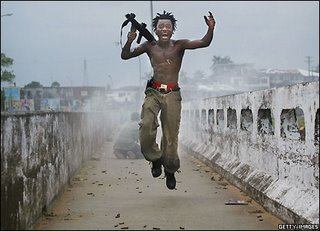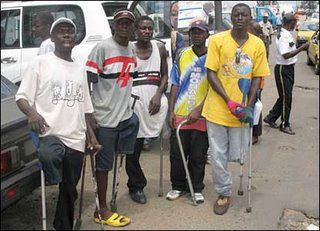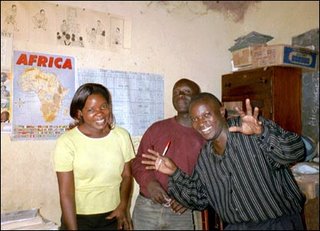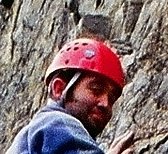War and Rebirth: Some thoughts on Africa
Remember Europe in the mid-1990s: a multitude of separate nations and economies, some booming, some struggling and a full-blown genocide occuring in a country that used to be called Yugoslavia. The European Union was in its fledgling state, not yet the economic and political power-block that it is now. The western world jumped to the aid of the Bosnians, I certainly remember nightly broadcasts from a bullet-ridden hive of snipers called Sarajevo. There were great failures (such as the Srebernitza massacre of over 8000 Bosnian muslims) due to a United Nations tying its own hands militarily speaking and prefering negotiation with Milosevic while his para-military chetnicks ran rampant through the safe-zones. Nonetheless, the press of the world was there and we were reminded nightly how very important transpiring events were to ours and Europe's security.
Now try to remember Africa at the same time. Rwanda, the Hutus and the Tutsis. As Romeo Dallaire, the Canadian comander of U.N. forces in the region points out in his film "Shake hand with the Devil", his mission was provided with so little supplies and logisitical support, it was as if he was set up to fail in preventing the ensuing genocide. The world turned its back on Rwanda, and why not - it's Africa after all. It's tribalism and Rwanda has no strategic value. Nearly 1 million Rwandans died. Rwanda was the only conflict that caught any portion of the global media eye. The decades old and brutal civil war in Liberia was ongoing, no to mention the war that was termed "Africa's World War" (1998-2003) fought by rebel forces escaping Rwanda, Angolan Rebels, and Congolese rebels and government forces deep in the jungles of what was formerly known as Zaire (now called the Democractic Republic of the Congo). This war is still ongoing and has claimed 4 million lives over the course of its dreary 8 year run. Amnesty International reports that recent fighting has flared up and that the region is far too dangerous for aid workers to enter.

When I interviewed a UBC anthropologist about the genocide in the Angolan occupied enclave of Cabinda, he spoke of "charity-fatigue in the West." There seems, only so much that we can take of this misery, we just come to a point where we don't want to hear anymore. It seems however, that Rwanda, as grave the cost was in human life and suffering, has taught the world's media a harsh lesson. Though coverage has died down, the genocide in the Darfur region of Sudan has not. It bears the grim title of the first genocide of the 21st Century during which atleast 100,000 civilians have lost their lives at the hands of the Sudanese-government-backed Janjaweed Militia. The war has left hundreds of thousands in refugee camps along the border region with Chad. This is a problem that Africa is trying to handle for itself. Soldiers from the African Union (AU) police the camps and help provide water and medicine to the refugees. But the soldiers are undersupplied and rely on local pick-ups for transportation. When it comes to protecting the refugees from the raids of the Janajweed or the Chadian rebels be they looking for child soldiers to abduct, food, women to rape, or men to kill, the AU forces are outgunned and have been reported as standing aside as these crimes are committed. The AU is currently funded by the EU an the US, both of which want to see a UN force into Darfur. The president of Sudan has vowed to make Darfur a graveyard for foreign soldiers, and recent threats from Osama bin Laden seem to suggest that a UN force in the region would serve as a big-target for fighters in the region inspired by his message. A recent attack by Chadian rebels and the Janjaweed militia on the capital of Chad in an attempt oust the president, has resulted in increased tensions between the two countries. The attack was defeated, many of the attacking forces were child soldiers abducted from the refugee camps. The leaders of Chad threatened to expel all refugees from their border regions back into Darfur. The UN quickly stepped into to ease tensions.

The plight of child soldiers in African wars is well known to writer/journalists such as Ryszard Kapuscinski. The children are abducted from their families or refugee camps and kept as prisoners. Somali warlords would use amphetamines to suppress the hunger of their soldiers and work them into a drug-induced state. Cannabis is often used to suppress any feelings of pain. As Kapuscinski points out, children have little concept of self-preservation and would run madly into combat firing wildly while their adult counter-parts were more inclined to take cover in battle. Thus, the surviving children, addled with drugs, are psychologically broken and constructed into killing machines. Aid agencies have reported cases of child soldiers being returned to their long-lost families and then running away to find their soldier compatriots. What lives they may have had are cancelled out by the wars and warlords of their lands. When the wars end, and the soldiers are no longer needed, they return to the cities and seek employment. All too often, the legacy of the wars is a physical one for many.

Recently, there have been some developments in a positive direction that are worth noting. Four Sudanese nationals have been charged with war crimes in relation to Darfur and are having their assets seized. They include rebel leaders and military comanders of the government in Khartoum. The civil war that tore Liberia apart for so many years has ended, and the nation recently celebrated their first democractic election of a woman president (2 firsts). The notorious Charles Taylor, former president of Liberia and instigator of civil war in Sierra Leone as well as in his own nation was captured in Nigeria and is being put on trial by UN forces for crimes against humanity. Angola has enjoyed 2 years of relative peace after the end of their 30-year civil war. It is now enjoying relative prosperity due to its oil reserves (especially in the enclave of Cabinda - see link on sidebar).
It's easy to blame Africans for the problems of Africa. Indeed, endemic corruption is a hallmark trait of so many democratic and autocratic governments in the region. What is not so easy to admit or see is that we in the Western world both benefit from and encourage such corruption to maintain our standard of living in the West. Alberta-based corporation Talisman Incorporated has been exploring and drilling for oil in Sudan with full compliance and complicity of the Khartoum government long before Darfur made the nightly news. There have been reports of the Janjaweed militia being used to run civilians off their land to allow for unimpeded oil exploration. American oil-giant Chevron-Texaco has been doing business in Africa for over 40 years. In 1975, the corporation paid MPLA Angolan soldiers to take over oil fields in Cabinda (during the initial invasion of the Republic by Angolan troops). Countries like Nigeria and Angola are overflowing in oil and mineral wealth and yet, so little of that wealth finds its way back filtering amongst the citizens of those nations. Regions of the D.R. Congo are similarly rich in resources to the point where there have been recent rumblings of war amongst neighbouring nations. Once again, central Africa could sink back into its world war with barely a peep of acknowledgement or care from the World's media. Africa as a whole, through the auspices of the AU is taking major steps to address their regional problems. Any solutions will be impossible without an admission of complicity from the Western world in resource-exploitation of African nations, and steps taken to eliminate this economic relation. It is a relation that beckons back to the dark days of colonialism, the comparison is not difficult to draw. The first step is admitting that we as citizens of the west are part of the problem. After that, what are our options?
Donate, Unicef and Amnesty International do good work on the continent, if you can. Protest the complicity of cororations such as Talisman and Chevron in ongoing genocides. The least we can do is become aware. Africa has the strength and will to improve its own situation. This, however, is impossible when Western corporations ensure that progress is made impossible through support of regional government corruption and infighting for their own financial benefit. Africa is on the precipice: the 21st Century could hold amazing potential and growth for the continent. Already we are seeing this in the area of eco-tourism. Imagine travelling to Mauretania or Libya in the 1980s, now there are several tour agencies operating in those and other nations. While some regions are in recovery and growth mode, others, such as the Democratic Republic of the Congo, see no end to their suffering.
Generalisations on the continent are always cause for some concern. In the words of Kupscinski, Africa is too large, it is a cosmos, except in the minds of Westerners Africa does not exist.



0 Comments:
Post a Comment
<< Home